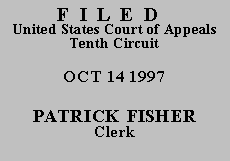

| JOE T. BELL,
v.
TOM WHETHEL |
No. 97-6126 (D.C. No. 96-CV-2093) |
Joe Thomas Bell appeals the dismissal without prejudice of his 42 U.S.C. § 1983 civil action for failure to pay an installment of the filing fee established for him by the court under 28 U.S.C. § 1915(b)(1). The court's investigation prior to dismissing the action showed Mr. Bell apparently spent his prison account on "canteen" rather than meet the installments ordered by the court. The court concluded Mr. Bell was not serious about his suit and dismissed as a consequence.
Mr. Bell has appealed, presenting documents to us indicating the failure to pay the required fee may have been caused by his jailers and that money had been drawn from Mr. Bell's account but not paid to the court. For numerous, but really irrelevant reasons, he asserts the dismissal by the district court was erroneous.
Our reading of the provisions of the Prisoner Litigation Reform Act leaves us in grave doubt whether a district court may dismiss a prisoner's case for failure to pay an installment of the docket fee. While the court relied on cases from other circuits to support its action, those cases antedated the PLRA and are not apposite.
The only statutory grounds for dismissal of the in forma pauperis action are set forth in § 1915(e)(2). None of those provisions are related to the nonpayment of fees. In the absence of statutory authority, dismissal for that reason is contrary to § 1915(b)(4) which prohibits the denial of access to the court on the grounds of poverty. See Walp v. Scott, 115 F.3d 308, 310 (5th Cir 1997).
Dismissal of the complaint was at worst, however, premature. The grounds for relief appear tenuous, and upon further determination by the district court, may even prove baseless. Nonetheless, we must REVERSE and REMAND WITH INSTRUCTIONS to reinstate the action.
ENTERED FOR THE COURT
John C. Porfilio
Circuit Judge
Judge Murphy dissents.
*. This order and judgment is not binding precedent, except under the doctrines of law of the case, res judicata, and collateral estoppel. This court generally disfavors the citation of orders and judgments; nevertheless, an order and judgment may be cited under the terms and conditions of 10th Cir. R. 36.3.